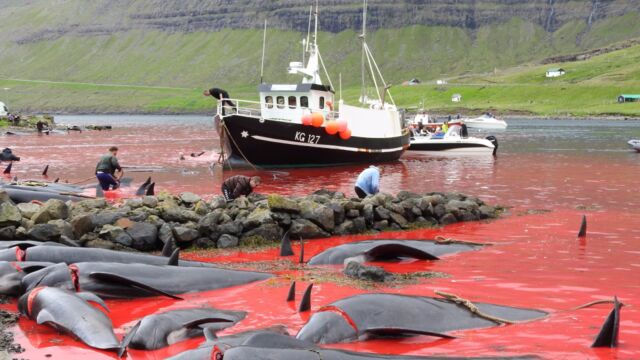This disturbing footage was provided by journalist Hugo Clément and the Sea Shepherd NGO. Grindadráp, literally ‘whale killing,’ is a Faroese tradition that every year spills as much blood as ink.
Discover our latest podcast
An ancestral tradition
This is the story of an ancestral tradition that the inhabitants of the Faroese archipelago, an autonomous province of Denmark located in the north of Scotland, have kept alive. At the time, the harsh and hostile climate did not favour crops and fishing was an essential means of feeding the population. A large hunt that consisted in killing the largest number of pilot whales was organised on a more or less regular basis, most often in the summer season. Entire families gathered on the beaches to witness these massacres.
The principle: an armada of boats heads offshore to trap groups of dolphins and line up to push them to the beaches. Frightened by the noise and boats, and in solidarity with their fellow creatures, trapped dolphins swim to the beaches until they run aground on the shore. Hundreds of inhabitants wait patiently for them, armed with knives and other blades, to slice their necks violently in order to kill them, collect them and recover their meat.
A species protected by the Berne Convention
This barbaric practice should in principle be prohibited, at least for this dolphin species, since the 1979 Berne Convention protects pilot whalesby recognising them as an endangered species. While Denmark has indeed signed this convention, the Faroe Islands has not, and therefore continues this massacre legally and with impunity.
Faced with this barbarism, many associations, including the Sea Shepherd NGO, tries to prevent these massacres by sending boats to clear a path for the dolphins and rescue them from the trap laid by the islanders. Unfortunately, Denmark got involved and decided to send its naval army to prevent Sea Shepherd's ships from intervening, despite their signing of the Berne Convention. The association, powerless, was therefore limited to merely filming and sharing this barbarism with the whole world.
A meat not meant to be consumed
When questioned by journalist Hugo Clément, the local inhabitants justified themselves by explaining that this is merely a hunt, which could be compared to the raising of beef, chicken or other animals for slaughter, and that the objective is to provide food for everyone. This is a difficult explanation to hear when we know that this meat is practically unfit for consumption because of the high content of heavy metals such as mercury, present in the oceans because of pollution. Consumption is therefore strongly discouraged or even prohibited for pregnant women and children. It is even recommended not to consume it more than once a month for a healthy male.
While it is difficult to counter the weight of tradition, this atrocious footage, which includes dolphins suffering, crying out and literally being slaughtered, pregnant females being gutted with their babies lying on the ground, or children watching and sometimes participating from an early age - as you can see in the video - is all making the international community react, especially on social networks where many voices have been raised to put an end to this barbaric practice.
The law protects Grindadráp
For the time being, legislation prevents any form of action, since the 2015 law obliges anyone who sees a group of pilot whales to report it to the Federated States authorities in order for the grindadráp to be organised. Activists can be arrested, fined £2,000 and detained if they obstruct this law. A fight that therefore still needs to be fought.















